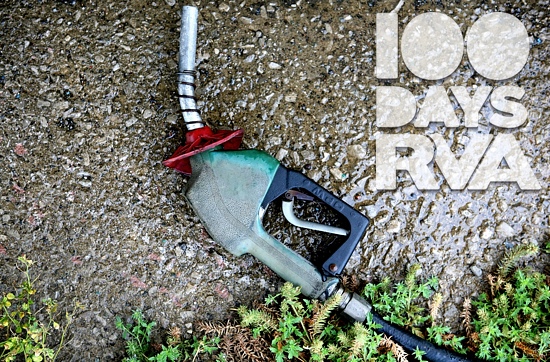Day #066: An anti-idling policy
Burning a gallon of gas creates 19.64 pounds of carbon dioxide. It’s time for wasteful consumption to be on par with littering.

Inspired by Michael Bierut’s 100 Day Project, 100 Days to a Better RVA strives to introduce and investigate unique ideas to improving the city of Richmond. View the entire project here and the intro here.
- Idea: Extend Richmond’s anti-idling policy from city vehicles to all vehicles within the city.
- Difficulty: 2 — Policies like these are extremely difficult to enforce. The majority of the benefits would be realized through drawing attention to the issues.
The US is facing serious environmental, geopolitical, and economic issues because of a massive dependence on fossil-fuels. Richmond does not have the power to set US energy policy, but it is best equipped to influence the finer details of citizen’s lives which can send signals about priorities while correcting for externalities. Richmond should extend its anti-idling policy from city vehicles to all vehicles within the city.
Richmond has done a good job setting new standards for itself, but it has not made enough progress demanding more out of its residents when it comes to sustainability. In 2011, the city instituted an anti-idling policy for its fleet (PDF) because “unnecessary idling wastes money, fuel, contributes to air pollution, and causes premature engine wear.”
The impact of the anti-idling policy is tough to measure because of the number of confounding variables and difficulties in data collection, but even more important than the savings is the message it sends to employees.
In Hot, Flat, and Crowded, Thomas Friedman shares that an idling car produces 20x the emissions of a car going 30 mph. Knowing this, an anti-idling ordinance seems even more essential than an anti-littering ordinance. However, that legislation is less politically realistic because the consequences of an idling engine are less palpable than Twinkie wrappers lining the curbs of Broad Street or empty PBR cans by the gazebo in Chimborazo Park.1
Burning a gallon of gasoline creates 19.64 pounds of carbon dioxide. This is an unfortunate cost of many facets of our lives, but it is unacceptable when it is simply for waste. Even climate change deniers can recognize the avoidable degradation of Richmond’s air quality or the increased demand put on gasoline–which forces up prices.
In a better America, solutions to these problems would be addressed at the federal level, but Congress is incapable of putting together a bipartisan commission on bipartisanship right now. Climate change and oil scarcity are two of the biggest threats to Richmond’s future.
This isn’t a green revolution, but small signals from our government that when combined with nine months and eighteen years could politically prepare the next generation for the types of changes we need in order to effectively dampen the serious consequences of our dependence on fossil fuels.
Love this idea? Think it’s terrible? Have one that’s ten times better? Head over to the 100 Days to a Better RVA Facebook page and join in the conversation.
Photo by: lundgrenphotography
-
Recommend this
on Facebook -

Report an error
-

Subscribe to our
Weekly Digest





There is 1 reader comment. Read it.